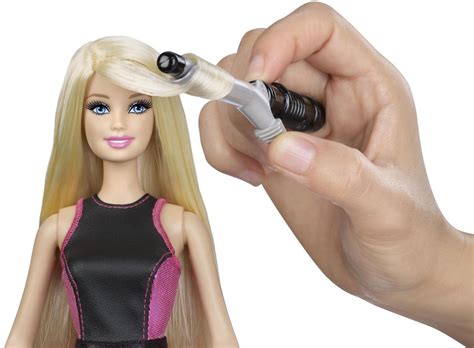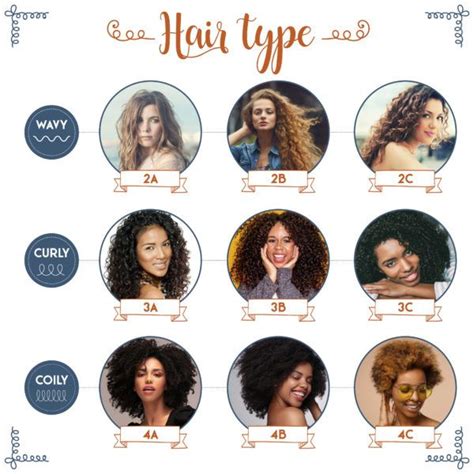From luscious ringlets to bouncy waves, curly hair comes in a captivating array of textures and patterns. Embracing its unique beauty and understanding its specific needs is key to unlocking its full potential. Let’s dive into the captivating world of curly hair, exploring its diverse categories and unraveling the secrets to maintaining its health and vibrancy.

Understanding Curly Hair Types
The Andre Walker Hair Typing System, widely recognized by hairstylists and hair care enthusiasts, classifies curly hair into four main types, further subdivided into three subcategories each. This system provides a comprehensive framework for identifying and caring for different curl patterns.
| Curl Type | Subcategory | Description |
|---|---|---|
| Type 2: Wavy | 2A | Loose, undefined waves that can be enhanced with styling products. |
| 2B | More pronounced waves that hold their shape better. | |
| 2C | Tight, S-shaped waves that may appear curly when dry. | |
| Type 3: Curly | 3A | Loose, bouncy curls that form spirals with a diameter of about an inch. |
| 3B | Defined curls with a springy texture and a diameter of about half an inch. | |
| 3C | Tight, corkscrew curls with a diameter of less than half an inch. | |
| Type 4: Coily | 4A | Fine, tightly coiled curls that resemble springs or zigzags. |
| 4B | Coarse, tightly coiled curls that have a wiry texture. | |
| 4C | Very tightly coiled curls that are densely packed and appear like a mass of tiny coils. |
Curly Hair Characteristics
In addition to varying curl patterns, curly hair also exhibits distinct characteristics that set it apart from other hair types. These include:
- High Porosity: Curly hair has a raised cuticle layer, allowing it to absorb moisture easily but also making it more susceptible to damage.
- Dryness: The natural oils produced by the scalp have difficulty traveling down the curved hair shaft, resulting in increased dryness.
- Frizziness: The raised cuticle layer can create friction, causing hair strands to break and appear frizzy.
- Volume and Shrinkage: Curly hair tends to be voluminous due to its spiral shape, but it can also shrink significantly when wet.
Embracing and Caring for Curly Hair
Managing curly hair requires embracing its unique characteristics and adopting a specialized care routine. Here are some essential tips:
- Use sulfate-free shampoos and conditioners: Harsh surfactants like sulfates can strip natural oils, exacerbating dryness.
- Deep condition regularly: Deep conditioners provide intense moisture and nourishment, helping to combat dryness and prevent breakage.
- Avoid heat styling: Excessive heat can damage curly hair, so embrace air-drying or use heat-protectant products when necessary.
- Detangle with care: Use a wide-toothed comb or brush to prevent breakage. Start detangling from the ends and work your way up to the roots.
- Embrace products designed for curly hair: Formulations specifically designed for curly hair can enhance manageability, reduce frizz, and protect against damage.
The Future of Curly Hair Care
Innovation in the beauty industry is constantly evolving, leading to advancements in hair care products and treatments for curly hair. Here are some exciting developments:
- Plant-based ingredients: Natural oils and extracts from plants like argan, coconut, and shea butter are gaining popularity for their moisturizing and protective properties.
- Microbiome-friendly products: Products that support a healthy scalp microbiome can help reduce dryness and inflammation, promoting healthy hair growth.
- Customized hair care: Personalized hair care regimens tailored to specific curl patterns and hair needs are becoming increasingly available.
Frequently Asked Questions
Q: What is the best way to wash curly hair?
A: Use sulfate-free shampoo, conditioner, and detangle with care to avoid breakage.
Q: How often should I deep condition my curly hair?
A: Deep condition at least once a week to provide intense moisture and nourishment.
Q: Can I use a diffuser to dry my curly hair?
A: Yes, a diffuser can help reduce frizz and preserve curl definition while drying.
Q: What are some natural products that can benefit curly hair?
A: Argan oil, coconut oil, and shea butter are excellent natural moisturizers.
Q: How can I reduce frizz in my curly hair?
A: Use anti-frizz products, avoid heat styling, and deep condition regularly.
Q: Why does my curly hair get tangled so easily?
A: Curly hair has a raised cuticle layer that can create friction and lead to tangles. Detangle with care and use detangling products.
Q: Can I dye my curly hair?
A: Yes, but use a color-safe shampoo and conditioner and avoid harsh chemical treatments.
Q: How can I style my curly hair without heat?
A: Use curl-defining products, detangling sprays, and air-dry or use a diffuser.
